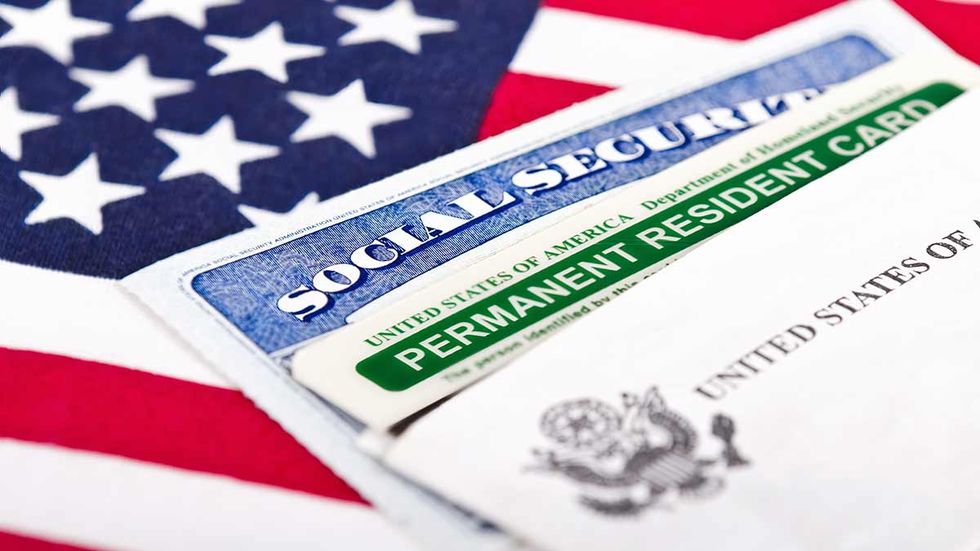
© 2024 Blaze Media LLC. All rights reserved.
Immigration is an elective policy of a sovereign nation. It should benefit America and never create a public charge. That notion is one of the most foundational principles of our country. It dates back to colonial times and has been enforced by the states since the founding and then by the federal government when it fully reclaimed immigration in the 1880s. That immigrants shouldn’t be a public charge is still the law on the books, yet it’s rarely enforced. Now that the Trump administration is seeking to enforce the law, suddenly the Left is screaming about denying immigrants their rightful citizenship.
NBC published a report predicting that any week now, Stephen Miller will convince President Trump to sign off on a policy denying citizenship to those immigrants on welfare. In other words, he will be the first president in recent years to follow the letter and spirit of immigration statutes. The media is ready with a barrage of sob stories with no regard for the harm to American citizens.
Our history, tradition, and law: Immigration should only benefit the nation
The notion of immigrants coming here and obtaining public assistance would have been foreign to our Founders, even if they could have envisioned a welfare state for those already here. In 1813, Madison said emphatically to Morris Birkbeck, “… it is not either the provision of our laws or the practice of the Government to give any encouragement to emigrants, unless it be in cases where they may bring with them some special addition to our stock of arts or articles of culture.”
As I note in Chapter 6 of my book, this is why, already in the 1600s, the northern colonies, and later on the southern colonies, adopted public charge laws denying entry to “paupers.” Even after the Constitution was already signed but still in the process of being ratified, the Continental Congress passed a law in 1788, pursuant to the Articles of Confederation, urging states to pass laws “preventing the transportation of convicted malefactors from foreign countries.” A number of states followed suit and banished those viewed as criminals or impoverished.
During the debate over the Naturalization Act of 1790, Madison declared, “I do not wish that any man should acquire the privilege [citizenship], but such as would be a real addition to the wealth or strength of the United States.”
In the 1820s and ’30s, New York, Massachusetts, and Maryland (the “border states” of those days) passed laws mandating inspections of landing vessels at the ports to weed out those who would likely be a public charge. In City of New York v. Milne (1837), the Supreme Court deemed New York’s regulation of ships transporting immigrants preventing “multitudes of poor persons” from coming “without possessing the means of supporting themselves” as constitutional and not infringing upon the foreign commerce power of the federal government.
There can be no mode in which the power to regulate internal police could be more appropriately exercised. … Can anything fall more directly within the police power and internal regulation of a state than that which concerns the care and management of paupers or convicts or any other class or description of persons that may be thrown into the country and likely to endanger its safety, or become chargeabl[e] for their maintenance?
If this is how our early political figures thought of state powers to reject public charge (and certainly criminals), how much more so the power of the federal government to protect the whole of the union? Massachusetts passed a similar law, in 1837 when immigration began to increase, requiring an inspection of all aliens aboard a ship and denying the right to land to any passenger thought to be indigent unless the master of the vessel posted bond to ensure that no such “indigent passenger shall become a city, town, or state charge within 10 years.”
While the federal government was able to regulate immigration any time after 1808, pursuant to Art. I Sec. 9, it only regulated naturalization and left the laws of entry to the “border states” like New York and Massachusetts for many of the early years. However, even during that time, since most people would only emigrate en masse with support of the government, the State Department often used diplomatic tools to block public charges (see the Chinese Exclusion case).
Once Congress reclaimed the full power to regulate entry in 1882, these state public charge laws were codified into federal law almost verbatim. The laws passed in the 1880s and 1890s not only barred the entry of those who would constitute a public charge (still the law on the books), but held the owner of the vessel that transported those aliens liable for the cost of their return trip and their temporary stay on American soil. These laws were so strictly enforced that even inadmissible aliens who came during World War I (and couldn’t return to Europe) were only given temporary harbor if relatives paid for their entire stay (see Kaplan v. Tod, 1925).
The open-borders Left is out of touch with law, history, and tradition
These laws have more or less been on the books since that time period. Even during the passage of the 1965 immigration bill, Ted Kennedy promised that “no immigrant visa will be issued to a person who is likely to become a public charge.”
Under Section 212(a)(4) of the Immigration and Nationality Act (INA), an individual seeking admission to the United States or seeking to adjust his status to permanent resident (obtaining a green card) is inadmissible if the individual "at the time of application for admission or adjustment of status, is likely at any time to become a public charge." Section 237(a)(5) contains the deportability provision for public charge. Among the factors that are to be assessed when making this determination are “assets, resources, and financial status; and education and skill.” In addition, section 213(a) empowers the attorney general to require sponsors to sign an affidavit agreeing “to maintain the sponsored alien at an annual income that is not less than 125 percent of the Federal poverty line.”
Yet over the past few decades, with the concurrent growth of the welfare state and mass migration from largely impoverished countries, this law has not been enforced at all. We have illegals costing America hundreds of billions in education, welfare, health care, and child care costs and, recently, in taxpayer-funded legal aid, contrary to law.
The legal immigration hasn’t been much better in many cases. According to an analysis from then-Senator Jeff Sessions, just 9,700 applications out of more than 116 million — a mere .00008 percent of immigration applications — were disqualified “on the public charge basis between FY 2005 and FY 2011.” In fact, on the U.S. Citizenship and Immigration Services website, there is an entire page dedicated to advertising a selection of welfare benefits to newly arrived immigrants.
Consider that in 1970, the poverty rate among immigrants stood at 18 percent, only slightly higher than the 14 percent of the native-born population. Now the poverty rate among immigrants has grown to 28 percent compared to 15 percent among native-born citizens.
Consider that immigrants from almost all of the top 20 sending countries have higher rates of welfare usage than native-born citizens. Among the immigrants from the top sending country, Mexico, 60.3 percent receive some benefit program. The existing waiting list of nearly five million immigrants is dominated by the same countries.
One particular program, the Cuban Adjustment Act, has been abused so much that thousands of Cuban immigrants can come to Florida without legal status and immediately apply for welfare.
According to an exposé by the Florida Sun-Sentinel, a number of these welfare recipients collect their benefits only to return home to Cuba! They discovered that the “sense of entitlement is so ingrained that Cubans routinely complained to their local congressman about the challenge of accessing U.S. aid—from Cuba.”
Which brings us back to the alleged White House proposal to actually enforce public charge laws. It’s quite entertaining to watch the open-borders crowd go from explaining how these are the most prosperous immigrants of all time to telling us that the proposal would dramatically cut immigration. Obviously, this is an admission that for decades they have been lying to us about the nature of many of the immigrants coming to the country and just how many of them receive welfare.
Immigration has rocketed up to the top issue on the minds of voters this cycle. There are so many winning messages Republicans can disseminate for the next 100 days on stopping the fleecing of America. Indeed, perhaps if Republicans ran on this bedrock principle — making immigration only a positive for America — rather than sounding like mini-me Democrats promoting “dreamers” like Balderson did in Ohio during the special election, maybe they wouldn’t be winning 11-point R districts by less than one point.
#mc_embed_signup{background:#fff; clear:left; font:14px;}
/* Add your own MailChimp form style overrides in your site stylesheet or in this style block.
We recommend moving this block and the preceding CSS link to the HEAD of your HTML file. */
Want to leave a tip?
We answer to you. Help keep our content free of advertisers and big tech censorship by leaving a tip today.
Want to join the conversation?
Already a subscriber?
Blaze Podcast Host
Daniel Horowitz is the host of “Conservative Review with Daniel Horowitz” and a senior editor for Blaze News.
RMConservative
Daniel Horowitz
Blaze Podcast Host
Daniel Horowitz is the host of “Conservative Review with Daniel Horowitz” and a senior editor for Blaze News. He writes on the most decisive battleground issues of our times, including the theft of American sovereignty through illegal immigration, theft of American liberty through tyranny, and theft of American law and order through criminal justice “reform.”
@RMConservative →more stories
Sign up for the Blaze newsletter
By signing up, you agree to our Privacy Policy and Terms of Use, and agree to receive content that may sometimes include advertisements. You may opt out at any time.
© 2024 Blaze Media LLC. All rights reserved.
Get the stories that matter most delivered directly to your inbox.
By signing up, you agree to our Privacy Policy and Terms of Use, and agree to receive content that may sometimes include advertisements. You may opt out at any time.



